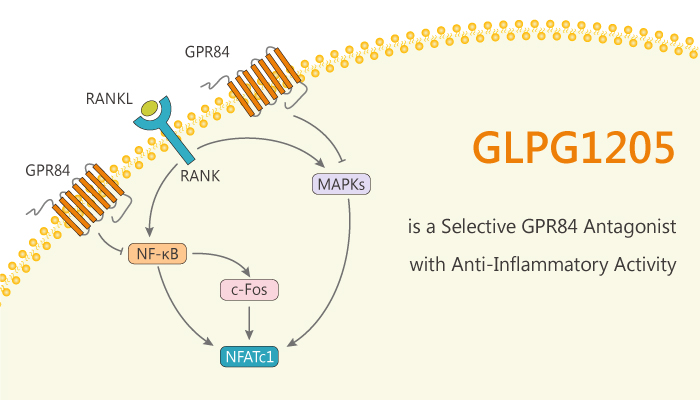GPR84 is a de-orphanized member of the G-protein coupled receptor (GPCR) family, it can recognize medium-chain fatty acids. GPR84 plays an important role in inflammation.
In this article, we will introduce a potent, selective and orally active GPR84 antagonist GLPG1205. Besides, we will describe this compound’s properties in vitro and in vivo.
Firstly, in vitro, the receptor-selective antagonist GLPG1205 together with ZQ16, a potent GPR84 selective agonist are identified in a high throughput screening study. Human neutrophils, monocytes and monocyte-derived macrophages (MDMs) can functionally express GPR84.
The agonist ZQ16 can trigger the G-protein coupled PLC-IP3-Ca2+ signaling pathway. At the same time, It mobilizes intracellular granules, chemotactic migration, as well as an assembly of ROS generating NADPH-oxidase.
However, GLPG1205 completely inhibits ZQ16-induced [Ca2+] I response in neutrophils. Besides, the selectivity of this inhibitor for GPR84 shows that GLPG1205 does not affect the FPR1- and FFA2R-mediated Ca2+ responses. In monocytes, there shows an identical inhibition pattern. GLPG1205 (1 μM; for 5 min) completely blocks the ROS-response induced by the GPR84-agonist in the macrophages.
Following, GLPG1205 can antagonize ZQ16-induced ROS with an IC50 value of 15 nM in TNFα primed neutrophils. Moreover, GLPG1205 has no response on FFA2R agonist Cmp1and he FPR1 agonist fMLF-induced ROS. this furtherly strengthens the selectivity of the antagonist GLPG1205 for GPR84.

Lastly, we will give some examples of activity in vivo of GLPG1205.
In the idiopathic pulmonary fibrosis (IPF) model, GLPG1250 (orally administration; 30mg/kg; twice daily) for 2 weeks, start from 7 days post-challenge greatly reduces the Ashcroft score.
In the irradiation model, GLPG1250 (orally administration; 30mg/kg; once daily) starts from 18 weeks post-irradiation, significantly reduces college deposition in the mouse lung. Additionally, GLPG1250 inhibits the increase in MnSOD in lung bronchial epithelial cells and parenchymal macrophages.
In a mouse IBD model (DSS), GLPG1205 dose-dependently decreases disease activity, histological activity, the neutrophil influx, and colonic MPO content.
In summary, GLPG1205 is potent and selective GPR84 (a G-protein-coupled receptor) antagonist. Additionally, it has anti-inflammatory activity and is used for the treatment of pulmonary fibrosis.
Reference:
[1]. Sundqvist M, et al. Biochim Biophys Acta Mol Cell Res. 2018 May;1865(5):695-708.
[4]. F.Vanhoutte, et al. Human safety, pharmacokinetics, and pharmacodynamics.